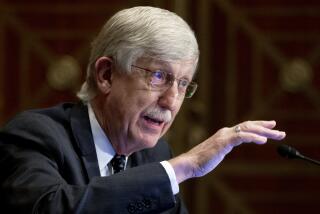Health Secretary Takes Aim at Older Smokers : Tobacco: It is ‘never too late to stop’ and reap benefits of doing so, Sullivan says. It is the latest phase of his anti-cigarette campaign.
- Share via
ORLANDO, Fla. — Health and Human Services Secretary Louis W. Sullivan Thursday took his anti-smoking crusade on the road, appealing to older Americans, many of whom have been puffing on cigarettes for decades.
It is “never too late to stop,” he said.
Sullivan said that the federal government will start a special public service campaign in the fall, complete with mass mailings to doctors, television commercials and celebrity endorsements, to help Americans over the age of 50 “quit that horrible habit.”
“Your body can repair much of the damage smoking has done,” Sullivan told delegates to the biennial convention of the American Assn. of Retired Persons.
The 32-million-member AARP will join Sullivan’s department and another Cabinet agency, the Department of Veterans Affairs, in the drive.
With budget stringency preventing development of major new spending programs, Sullivan has adopted the smoking issue as a high-profile campaign for the huge federal department he heads.
“You may know that I have helped our community groups oppose tobacco company plans to market new cigarettes to blacks as well as young white females as well as existing brands to sports fans and to minors,” Sullivan told the delegates. “Now, it is your turn.”
R. J. Reynolds Tobacco Co. abandoned a major investment in a proposed brand, Uptown, aimed at black consumers, after Sullivan assailed the company in January. A day after his speech, in which Sullivan accused the company of “slick and sinister” efforts to promote “the culture of cancer,” Reynolds dropped its plan to test market the new cigarette in Philadelphia.
Uptown was a mentholated cigarette, aimed at black smokers. About 75% of black smokers use mentholated brands, compared with only 23% of white smokers.
Sullivan also chastised Reynolds after it was disclosed that the company was considering marketing plans for a brand to be called Dakota, aimed at uneducated young white women between the ages of 18 and 24. Sullivan has mounted a continuous broadside of criticism against the tobacco industry, including a charge that sports events are taking “blood money” by allowing sponsorship by cigarette producers.
Sullivan said that more than 13 million people 50 and older smoke, but two-thirds of them say they want to quit.
“Some older Americans who smoked for decades may think that the damage smoking does to their bodies cannot be reversed,” he said. “I am here to tell you that such thinking is wrong--dead wrong. It is never too late to stop.”
Sullivan said that even those who have smoked for nearly 50 years can add to their longevity by quitting. “Your body can repair much of the damage smoking has done if you stop.”
The functions of the heart and the blood circulation begin to improve within months after a person stops using cigarettes, the secretary said. A year after a smoker quits, “the extra risk of dying from a heart attack caused by smoking is gone,” he said.
Sullivan told the delegates that “smokers who have diseases like emphysema and bronchitis also have hope if they stop smoking, because those conditions will stabilize and get no worse--once a smoker stops.”
Despite the massive wave of publicity since the 1964 surgeon general’s report linking lung cancer and smoking, millions of people are still unaware of the threat, Sullivan told a news conference after his convention speech.
About 30% of low-income Americans either do not know or do not believe that smoking endangers their health, he said. More than 400,000 people a year die from diseases linked to smoking, he said.
The campaign will make a special effort to reach doctors through mailings, contacts with professional societies and communications to hospital staffs. The drive will be started in late September, linked to a special report by the surgeon general on the benefits of quitting smoking.
Sullivan told the AARP delegates, whose membership age ranges from 50 to the 90s, that “older smokers who stop will sleep better and breathe better. They will walk farther without running out of breath.”
Sullivan said also that his department will step up its efforts to detect and punish abuse of older Americans. New regulations for nursing homes receiving federal funds will become effective Oct. 1. “We will require stronger reporting investigations, resolution and follow-up of abuse incidents in nursing homes that want to continue as Medicare or Medicaid providers,” Sullivan said.
A recent report by the House Committee on Aging indicated that there has been a substantial increase in physical abuse, violence and mistreatment against older Americans.
“We want the states to report abuse convictions for possible sanctions” against nursing homes, Sullivan told the delegates.
The government can levy fines against nursing homes in which abuse takes place or bar the institutions from participating in federally financed programs.
“To abuse an elderly person, whether at home or in a nursing home, is an inhuman act,” Sullivan said. “It is a crime pure and simple.”
BACKGROUND
Emboldened by passage of a smoking ban on virtually all domestic airline flights, tobacco foes in Congress are targeting cigarette marketing practices. Congress last acted on cigarette advertising in 1984, when it adopted the current series of rotating label warnings. New proposals would bar the use of alluring models and other imagery in cigarette ads and create a federally funded education and media campaign to warn of smoking’s dangers.
More to Read
Sign up for Essential California
The most important California stories and recommendations in your inbox every morning.
You may occasionally receive promotional content from the Los Angeles Times.













